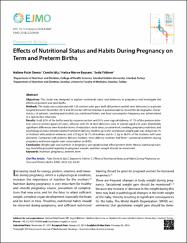Effects of Nutritional Status and Habits During Pregnancy on Term and Preterm Births
Özet
Objectives: This study was designed to explore nutritional status and behaviors in pregnancy and investigate the effects on preterm and term births. Methods: The study was conducted with 120 mothers who gave birth (60 preterm and 60 term deliveries) in a private hospital between November 2015 and December 2015 in Istanbul. A questionnaire to record the demographic characteristics of patients, smoking and alcohol use, nutritional habits, and food consumption frequency was administered in a face-to-face interview. Results: In all, 65% of the births were by cesarean section and 35% were vaginal delivery; 41.7% of the preterm deliveries were in women aged ≥35 years, whereas only 5% of term deliveries were in women aged ≥35 years. Statistically significant differences were found in terms of education, work status, income level, smoking, pregnancy nutrition, and psychological status between preterm and term delivery mothers (p<0.05). Gestational weight gain was ≤8 kg in 36.7% of mothers with preterm deliveries and ≥12 kg in 36.7% of mothers and 8-12 kg in 68.3% of the mothers with term deliveries. Compared with preterm delivery mothers, term delivery mothers had fewer nutritional problems during pregnancy and more regular meal consumption (p<0.05). Conclusion: Weight gain and nutrition in pregnancy are variables that affect preterm birth. Hence, nutritional training should be provided regularly to pregnant women, and their weight should be monitored.
Cilt
2Sayı
2Bağlantı
http://hdl.handle.net/11363/1103Koleksiyonlar
Aşağıdaki lisans dosyası bu öğe ile ilişkilidir:


















